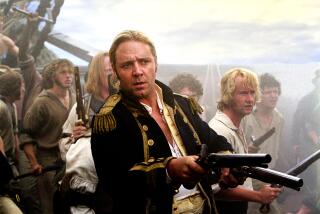Movie review: ‘The Way Back’
- Share via
A small group of determined survivors walks together toward freedom — through a forest, a blizzard, a desert, across mountains. From this elemental premise comes the basic drama of “The Way Back,” a based-in-fact tale of a how a handful of prisoners escaped from a Soviet gulag in 1940 and walked some 4,000 miles from Siberia to India.
The film, the first from director Peter Weir since “Master and Commander: The Far Side of the World” in 2003 and opening Wednesday in a brief local run for awards qualification before returning to theaters next month, is by turns rigorously spare, bracingly direct and then disconcertingly inclined toward an ill-fitting sentimentality.
Shot in India, Bulgaria and Morocco, the film has the feel of an older vista-strewn adventure yarn that seems purposefully out of step with the green-screen, CGI’d techniques of today. Real people captured simply in real locations provides a palpable feeling that simply would not have been the same had the cast — which includes Ed Harris, Colin Farrell, Jim Sturgess, Saoirse Ronan and Mark Strong, offering fine, distinctive turns — been wandering around some soundstage in Burbank.
That a production this ambitious has been financed and distributed outside the studio system throws a curveball to anyone who thinks “independent film” can mean only urban moderns sitting in an apartment bemoaning their ennui.
Early in “The Way Back,” a jailer tells the newly arriving inmates that the gulag itself is only part of what holds them, that the roughly inhospitable surrounding area, and by extension the world itself, is what will really keep them captive. In some ways this is the essential heart of the film — and even arguably the overriding theme of Weir’s entire body of work — exploring how much a human can endure and overcome, how hard one must push to accomplish a single goal.
In one of the film’s richest, most subtly evocative moments, Farrell’s character, a Russian criminal allowed along on the journey mostly because he has a knife, acknowledges his own limits while also perhaps succumbing to a lack of imagination about himself, being ruled by what others have imposed upon him.
The story is based on — “inspired by” is the actual credit — the 1956 book “The Long Walk” by Slavomir Rawicz, which has been largely discredited as a true account in the years since its publication. Yet rather than worry about the veracity of Rawicz’s memoir, Weir, working with co-writer Keith Clarke, seems to have found a freedom there, putting “The Way Back” in line with such other recent films as “The Social Network,” “I’m Still Here” and “Exit Through the Gift Shop,” which have teasingly trawled and at times discarded the divide between authentic truth, dramatic intent and emotional reality.
Sadly, the film’s energy dissipates as scene after scene of walking and talking begins to feel awkwardly repetitive. Weir also loses his nerve somehow, allowing in sentimental back stories and motivations that are largely absent from the film’s early going. Harris’ character, an American who came to Russia looking for work, in particular becomes less interesting the more information is revealed about him.
A brief sequence at the close that builds to a preposterous reunion scene marks the film’s biggest stumble; this final coda seems to bow to Hollywood convention when what has come before feels designed as a rebuke.
Nevertheless, as shot by cinematographer Russell Boyd, a longtime collaborator of Weir’s who won an Academy Award for his work on “Master and Commander,” “The Way Back” demands to be seen on the largest possible screen, the better to experience the way it visualizes an essential motivating tension between the small-scale intimacy and drama of its characters and the vast enormity of its landscapes.
In many ways, it might be identified as a “small” film — it’s from an upstart independent distributor and has had little ad support or a festival presence — but “The Way Back” in its best moments is as big as a movie can be, as big as life itself.
‘The Way Back’
MPAA rating: PG-13 for violent content, depiction of physical hardships, a nude image and brief strong language
Running time: 2 hours, 13 minutes
Playing: At AMC Covina 30, Covina
More to Read
Only good movies
Get the Indie Focus newsletter, Mark Olsen's weekly guide to the world of cinema.
You may occasionally receive promotional content from the Los Angeles Times.








